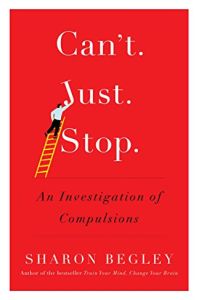Join getAbstract to access the summary!

Join getAbstract to access the summary!
Sharon Begley
Can’t Just Stop
An Investigation of Compulsions
Simon & Schuster, 2017
What's inside?
For some people, “compulsions” help lower anxiety; for others, they become tyrants ruling their lives.
Recommendation
Science writer Sharon Begley offers a careful, empathetic compendium of compulsion. While extreme “compulsions,” such as obsessive-compulsive disorder (OCD), are so debilitating that the psychiatric community classifies them as mental disorders, they grow from the same seeds as many common coping mechanisms for anxiety. Begley examines compulsions, explains why sufferers “can’t just stop,” and explores psychiatry’s evolving perspectives and discoveries. This readable, compassionate work may prove very useful to those who suffer from anxiety or compulsion and to those who care about them.
Summary
About the Author
Boston Globe senior science journalist Sharon Begley co-authored The Emotional Life of Your Brain and wrote the bestseller Train Your Mind, Change Your Brain.




















Comment on this summary